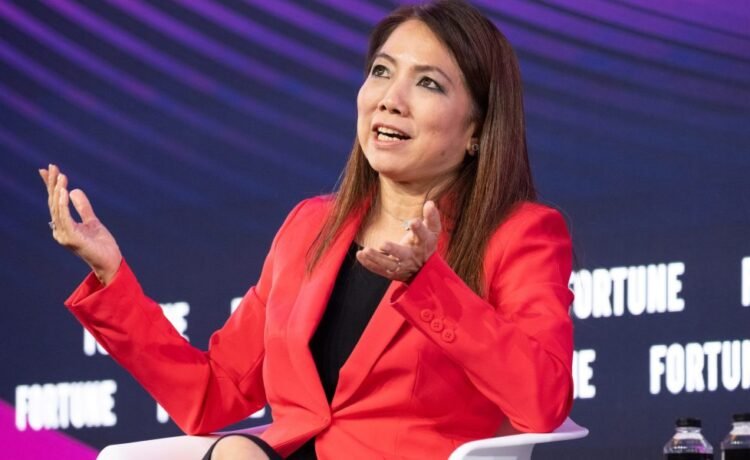
Programmers, creatives, even management consultants are worried AI is going to put them out of a job. But it turns out global banking CEOs are thinking about whether they can be automated away as well.
Tan Su Shan, CEO of DBS, the largest bank in Southeast Asia by assets, got a friendly reminder from her board of how even executives can be automated away upon her appointment to the Singaporean bank’s top job in late March.
“The day my CEO role was announced, I’m in a Whatsapp group with my board. I get a Whatsapp saying that even the CEO’s job will be replaced, or can be replaced, by AI,” Tan said Wednesday at the Fortune Brainstorm AI Singapore conference. “If I can be replaced by AI, so can everything else!”
That humility about AI drove Tan to push what she called the “four Rs” to her staff. “We’ve got to reinvent ourselves. We’ve got to stay relevant. We’ve got to be resilient, because it’s going to be volatile…and we have to be responsible,” she said.
It’s also changing hiring practices at the bank. “Don’t hire for knowledge, because knowledge is ubiquitous,” Tan said. “Hire for attitude, because you want to hire people who are agile, who are humble, who are able to say whatever I knew up to today is no longer relevant today or tomorrow.”
Tan took over DBS earlier this year, becoming its first woman CEO. She’s also No. 6 on Fortune’s Most Powerful Women ranking, which highlights the most powerful female executives in business.
DBS, founded in 1968, is Singapore’s largest bank. With $29 billion in revenue, it sits at No. 7 on the Fortune Southeast Asia 500, which ranks the region’s largest companies by revenue. With $8.4 billion in profit, it’s also the most profitable company on the list.
Even before she became CEO in March, Tan has been trying to get more of the bank’s employees to adopt AI. At last year’s Fortune Brainstorm AI Singapore conference, when she was still DBS’s head of institutional banking, Tan said her “number one” task was “getting everyone to drink the Kool-Aid” on AI.
In June, DBS estimated that its use of AI could be worth as much as one billion Singapore dollars ($782 million) this year.
At Fortune’s conference, Tan said while both junior and senior employees were eager to adopt AI, “it was the middle that was the least engaged.”
On Tuesday, DBS rolled out a generative AI-powered executive coach for its entire workforce. The bot is developed jointly with leadership coach Marshall Goldsmith. “Not everyone can afford him,” Tan said on Wednesday, “but a generative AI version of him can be done for all…every one of our staff now has this coach in the palm of his or her hand.”
Tan noted she told DBS staff that AI could make them “superhuman bankers”—and shared one personal example of how AI got her out of a work crisis.
“I remember going to a client pitch quite unprepared. As the client was talking to me, I had my phone under the table,” she said. Tan said she surreptitiously asked the AI to think of questions to ask. “The client said: ‘Wow, you know my business so well!”
“So I cheated,” Tan said, with a smile.
You Might Also Like
Iran could use AI to accelerate cyberattacks on U.S. and Israeli critical infrastructure
Could Iranian hackers try to use AI to attack critical infrastructure in the U.S., Israel, and the Gulf States? The...
Great Wealth Transfer is already happening as millennials hitting ‘Peak 35’ are richer than ever
Thirty, flirty, and thriving. Forget the dirty thirties: millennials are now entering their era of earning, and they’re only going...
Gen Z’s enthusiasm for all things touchable is resurrecting the analog economy—and costing parents
Generation Z has unexpectedly become the primary driver behind the rapidly growing analog music and print book economies in the...
World shakes its weary head at more Trump tariff chaos as he ‘says a lot of things, and many of them aren’t true’
The latest twist in the U.S. tariff roller coaster ride, launched when President Donald Trump returned to office 13 months ago...










